
NeMo-Agent-Toolkit
The NVIDIA NeMo Agent toolkit is an open-source library for efficiently connecting and optimizing teams of AI agents.
Stars: 1833
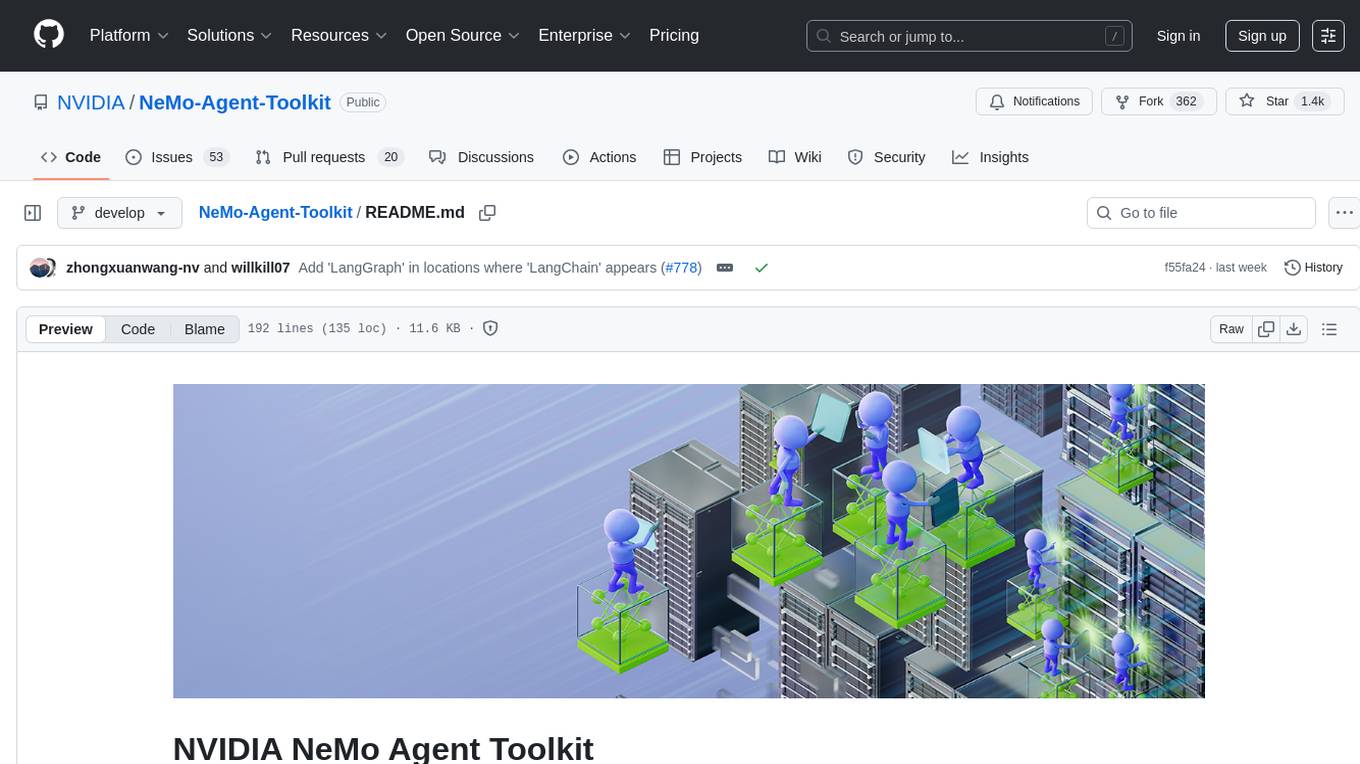
NVIDIA NeMo Agent toolkit is a flexible, lightweight, and unifying library that allows you to easily connect existing enterprise agents to data sources and tools across any framework. It is framework agnostic, promotes reusability, enables rapid development, provides profiling capabilities, offers observability features, includes an evaluation system, features a user interface for interaction, and supports the Model Context Protocol (MCP). With NeMo Agent toolkit, users can move quickly, experiment freely, and ensure reliability across all agent-driven projects.
README:
NVIDIA NeMo Agent Toolkit adds intelligence to AI agents across any framework—enhancing speed, accuracy, and decision-making through enterprise-grade instrumentation, observability, and continuous learning.
-
LangGraph Agent Automatic Wrapper: Easily onboard existing LangGraph agents to NeMo Agent Toolkit. Use the automatic wrapper to access NeMo Agent Toolkit advanced features with very little modification of LangGraph agents.
-
Automatic Reinforcement Learning (RL): Improve your agent quality by fine-tuning open LLMs to better understand your agent's workflows, tools, and prompts. Perform GRPO with OpenPipe ART or DPO with NeMo Customizer using NeMo Agent Toolkit built-in evaluation system as a verifier.
-
Initial NVIDIA Dynamo Integration: Accelerate end-to-end deployment of agentic workflows with initial Dynamo support. Utilize the new agent-aware router to improve worker latency by predicting future agent behavior.
-
A2A Support: Build teams of distributed agents using the A2A protocol.
-
Safety and Security Engine: Strengthen safety and security workflows by simulating scenario-based attacks, profiling risk, running guardrail-ready evaluations, and applying defenses with red teaming. Validate defenses, profile risk, monitor behavior, and harden agents across any framework.
-
Amazon Bedrock AgentCore and Strands Agents Support: Build agents using Strands Agents framework and deploy them securely on Amazon Bedrock AgentCore runtime.
-
Microsoft AutoGen Support: Build agents using the Microsoft AutoGen framework.
-
Per-User Functions: Use per-user functions for deferred instantiation, enabling per-user stateful functions, per-user resources, and other features.
- 🛠️ Building Agents: Accelerate your agent development with tools that make it easier to get your agent into production.
- 🧩 Framework Agnostic: Work side-by-side with agentic frameworks to add the instrumentation necessary for observing, profiling, and optimizing your agents. Use the toolkit with popular frameworks such as LangChain, LlamaIndex, CrewAI, Microsoft Semantic Kernel, and Google ADK, as well as custom enterprise agentic frameworks and simple Python agents.
- 🔁 Reusability: Build components once and use them multiple times to maximize the value from development effort.
- ⚡ Customization: Start with a pre-built agent, tool, or workflow, and customize it to your needs.
- 💬 Built-In User Interface: Use the NeMo Agent Toolkit UI chat interface to interact with your agents, visualize output, and debug workflows.
- 📈 Agent Insights: Utilize NeMo Agent Toolkit instrumentation to better understand how your agents function at runtime.
- 📊 Profiling: Profile entire workflows from the agent level all the way down to individual tokens to identify bottlenecks, analyze token efficiency, and guide developers in optimizing their agents.
- 🔎 Observability: Track performance, trace execution flows, and gain insights into your agent behaviors in production.
- 🚀 Agent Optimization: Improve your agent's quality, accuracy, and performance with a suite of tools for all phases of the agent lifecycle.
- 🧪 Evaluation System: Validate and maintain accuracy of agentic workflows with a suite of tools for offline evaluation.
- 🎯 Hyper-Parameter and Prompt Optimizer: Automatically identify the best configuration and prompts to ensure you are getting the most out of your agent.
- 🧠 Fine-tuning with Reinforcement Learning: Fine-tune LLMs specifically for your agent and train intrinsic information about your workflow directly into the model.
- ⚡ NVIDIA Dynamo Integration: Use Dynamo and NeMo Agent Toolkit together to improve agent performance at scale.
- 🔌 Protocol Support: Integrate with common protocols used to build agents.
- 🔗 Model Context Protocol (MCP): Integrate MCP tools into your agents or serve your tools and agents as an MCP server for others to consume.
- 🤝 Agent-to-Agent (A2A) Protocol: Build teams of distributed agents with full support for authentication.
With NeMo Agent Toolkit, you can move quickly, experiment freely, and ensure reliability across all your agent-driven projects.
Before you begin using NeMo Agent Toolkit, ensure that you have Python 3.11, 3.12, or 3.13 installed on your system.
[!NOTE] For users who want to run the examples, it's required to clone the repository and install from source to get the necessary files required to run the examples. Please refer to the Examples documentation for more information.
To install the latest stable version of NeMo Agent Toolkit from PyPI, run the following command:
pip install nvidia-natNeMo Agent Toolkit has many optional dependencies that can be installed with the core package. Optional dependencies are grouped by framework. For example, to install the LangChain/LangGraph plugin, run the following:
pip install "nvidia-nat[langchain]"Detailed installation instructions, including the full list of optional dependencies and their conflicts, can be found in the Installation Guide.
Before getting started, it's possible to run this simple workflow and many other examples in Google Colab with no setup. Click here to open the introduction notebook: .
-
Ensure you have set the
NVIDIA_API_KEYenvironment variable to allow the example to use NVIDIA NIMs. An API key can be obtained by visitingbuild.nvidia.comand creating an account.export NVIDIA_API_KEY=<your_api_key>
-
Create the NeMo Agent Toolkit workflow configuration file. This file will define the agents, tools, and workflows that will be used in the example. Save the following as
workflow.yml:functions: # Add a tool to search wikipedia wikipedia_search: _type: wiki_search max_results: 2 llms: # Tell NeMo Agent Toolkit which LLM to use for the agent nim_llm: _type: nim model_name: nvidia/nemotron-3-nano-30b-a3b temperature: 0.0 chat_template_kwargs: enable_thinking: false workflow: # Use an agent that 'reasons' and 'acts' _type: react_agent # Give it access to our wikipedia search tool tool_names: [wikipedia_search] # Tell it which LLM to use llm_name: nim_llm # Make it verbose verbose: true # Retry up to 3 times parse_agent_response_max_retries: 3
-
Run the Hello World example using the
natCLI and theworkflow.ymlfile.nat run --config_file workflow.yml --input "List five subspecies of Aardvarks"This will run the workflow and output the results to the console.
Workflow Result: ['Here are five subspecies of Aardvarks:\n\n1. Orycteropus afer afer (Southern aardvark)\n2. O. a. adametzi Grote, 1921 (Western aardvark)\n3. O. a. aethiopicus Sundevall, 1843\n4. O. a. angolensis Zukowsky & Haltenorth, 1957\n5. O. a. erikssoni Lönnberg, 1906']
- 📖 Documentation: Explore the full documentation for NeMo Agent Toolkit.
- 🧭 Get Started Guide: Set up your environment and start building with NeMo Agent Toolkit.
- 🤝 Contributing: Learn how to contribute to NeMo Agent Toolkit and set up your development environment.
- 🧪 Examples: Explore examples of NeMo Agent Toolkit workflows located in the
examplesdirectory of the source repository. - 🛠️ Create and Customize NeMo Agent Toolkit Workflows: Learn how to create and customize NeMo Agent Toolkit workflows.
- 🎯 Evaluate with NeMo Agent Toolkit: Learn how to evaluate your NeMo Agent Toolkit workflows.
- 🆘 Troubleshooting: Get help with common issues.
- [x] Automatic Reinforcement Learning (RL) to fine-tune LLMs for a specific agent.
- [x] Integration with NVIDIA Dynamo to reduce LLM latency at scale.
- [ ] Improve agent throughput with KV-Cache optimization.
- [ ] Integration with NeMo Guardrails to improve agent safety and security.
- [ ] Improved memory interface to support self-improving agents.
We would love to hear from you! Please file an issue on GitHub if you have any feedback or feature requests.
We would like to thank the following groups for their contribution to the toolkit:
-
Synopsys
- Google ADK framework support.
- Microsoft AutoGen framework support.
-
W&B Weave Team
- Contributions to the evaluation and telemetry system.
In addition, we would like to thank the following open source projects that made NeMo Agent Toolkit possible:
For Tasks:
Click tags to check more tools for each tasksFor Jobs:
Alternative AI tools for NeMo-Agent-Toolkit
Similar Open Source Tools

NeMo-Agent-Toolkit
NVIDIA NeMo Agent toolkit is a flexible, lightweight, and unifying library that allows you to easily connect existing enterprise agents to data sources and tools across any framework. It is framework agnostic, promotes reusability, enables rapid development, provides profiling capabilities, offers observability features, includes an evaluation system, features a user interface for interaction, and supports the Model Context Protocol (MCP). With NeMo Agent toolkit, users can move quickly, experiment freely, and ensure reliability across all agent-driven projects.

AgentUp
AgentUp is an active development tool that provides a developer-first agent framework for creating AI agents with enterprise-grade infrastructure. It allows developers to define agents with configuration, ensuring consistent behavior across environments. The tool offers secure design, configuration-driven architecture, extensible ecosystem for customizations, agent-to-agent discovery, asynchronous task architecture, deterministic routing, and MCP support. It supports multiple agent types like reactive agents and iterative agents, making it suitable for chatbots, interactive applications, research tasks, and more. AgentUp is built by experienced engineers from top tech companies and is designed to make AI agents production-ready, secure, and reliable.
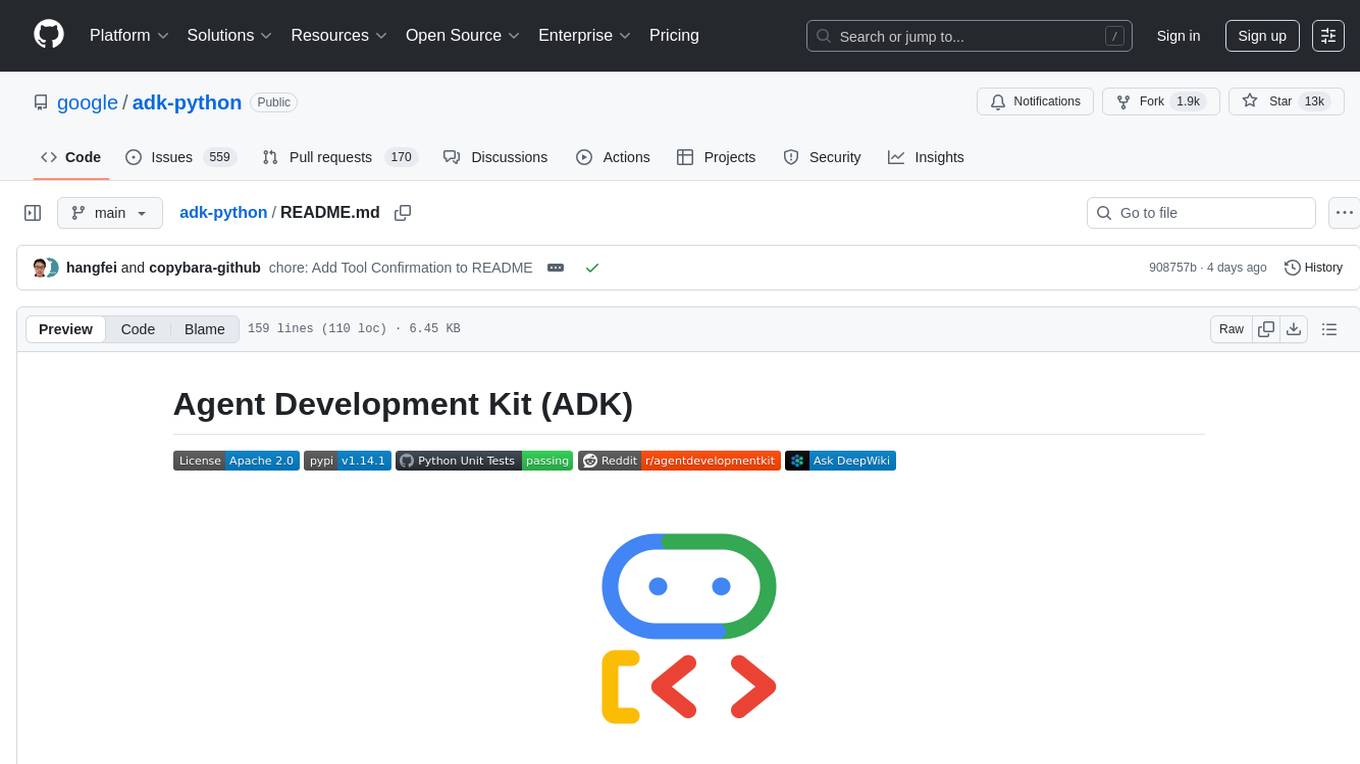
adk-python
Agent Development Kit (ADK) is an open-source, code-first Python toolkit for building, evaluating, and deploying sophisticated AI agents with flexibility and control. It is a flexible and modular framework optimized for Gemini and the Google ecosystem, but also compatible with other frameworks. ADK aims to make agent development feel more like software development, enabling developers to create, deploy, and orchestrate agentic architectures ranging from simple tasks to complex workflows.
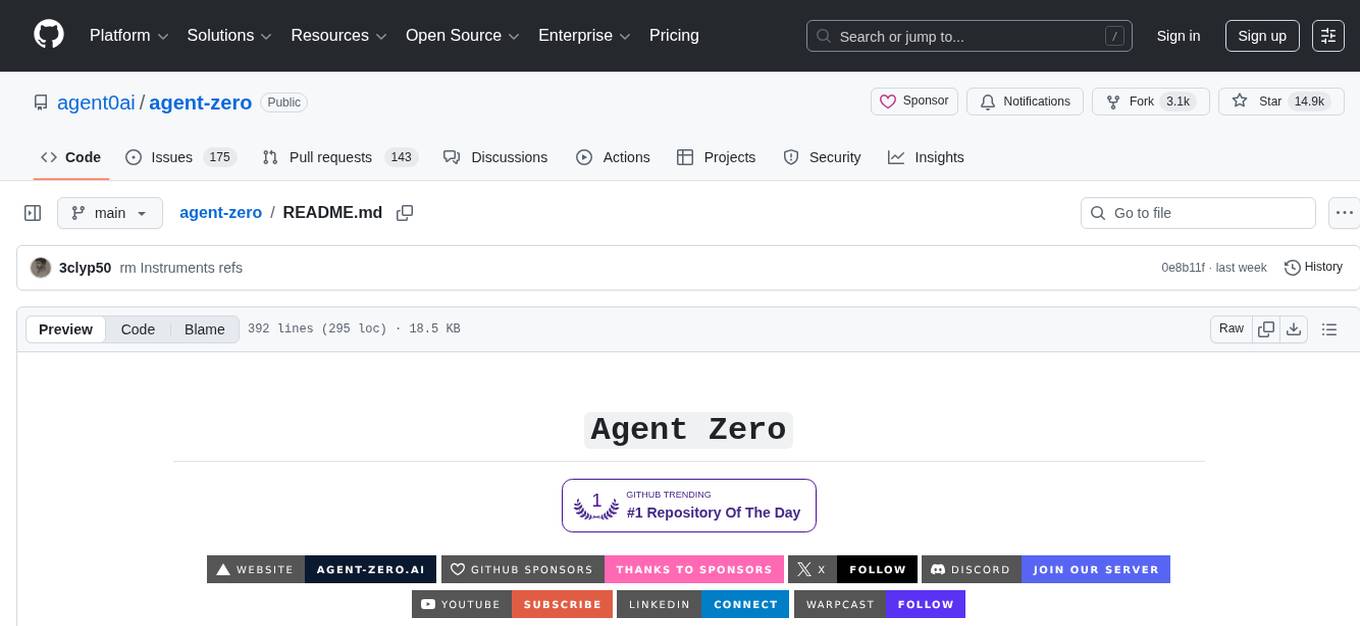
agent-zero
Agent Zero is a personal, organic agentic framework designed to be dynamic, transparent, customizable, and interactive. It uses the computer as a tool to accomplish tasks, with features like general-purpose assistant, computer as a tool, multi-agent cooperation, customizable and extensible framework, and communication skills. The tool is fully Dockerized, with Speech-to-Text and TTS capabilities, and offers real-world use cases like financial analysis, Excel automation, API integration, server monitoring, and project isolation. Agent Zero can be dangerous if not used properly and is prompt-based, guided by the prompts folder. The tool is extensively documented and has a changelog highlighting various updates and improvements.
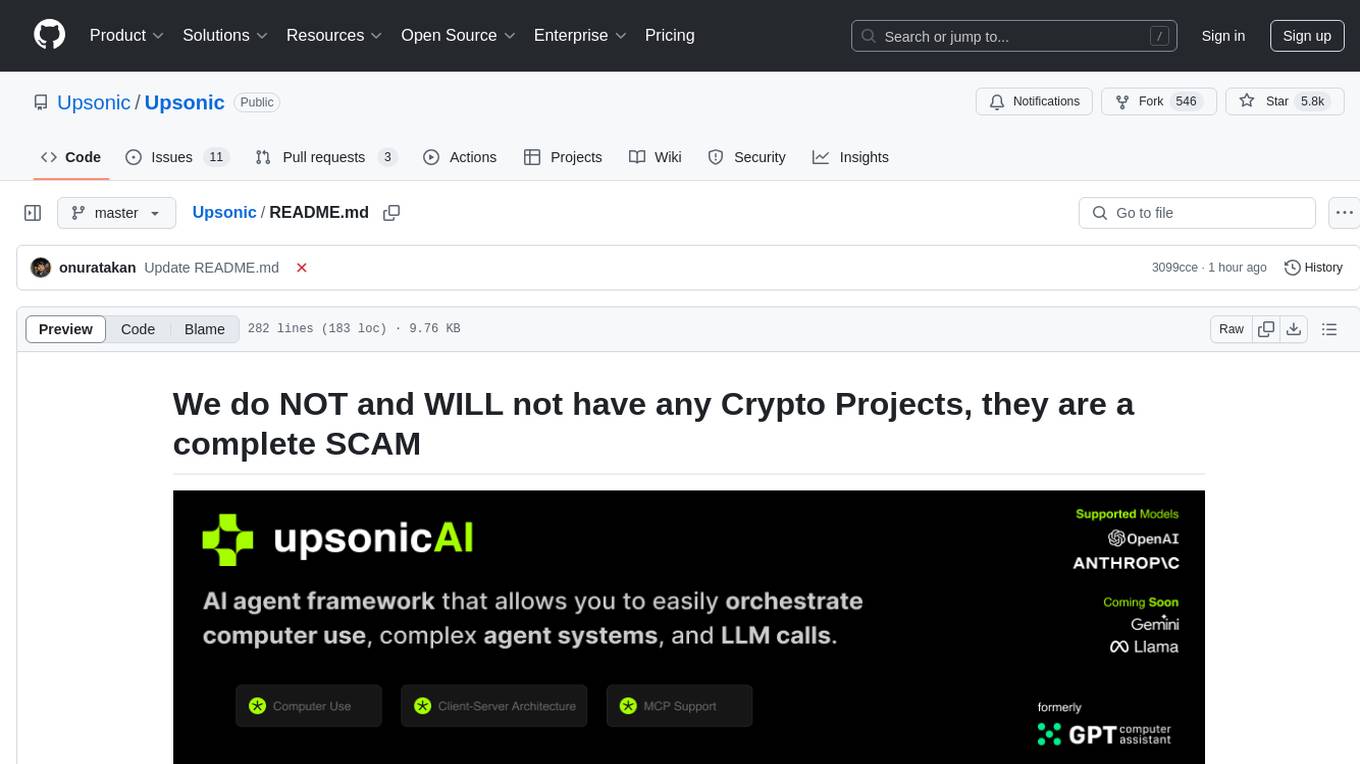
Upsonic
Upsonic offers a cutting-edge enterprise-ready framework for orchestrating LLM calls, agents, and computer use to complete tasks cost-effectively. It provides reliable systems, scalability, and a task-oriented structure for real-world cases. Key features include production-ready scalability, task-centric design, MCP server support, tool-calling server, computer use integration, and easy addition of custom tools. The framework supports client-server architecture and allows seamless deployment on AWS, GCP, or locally using Docker.
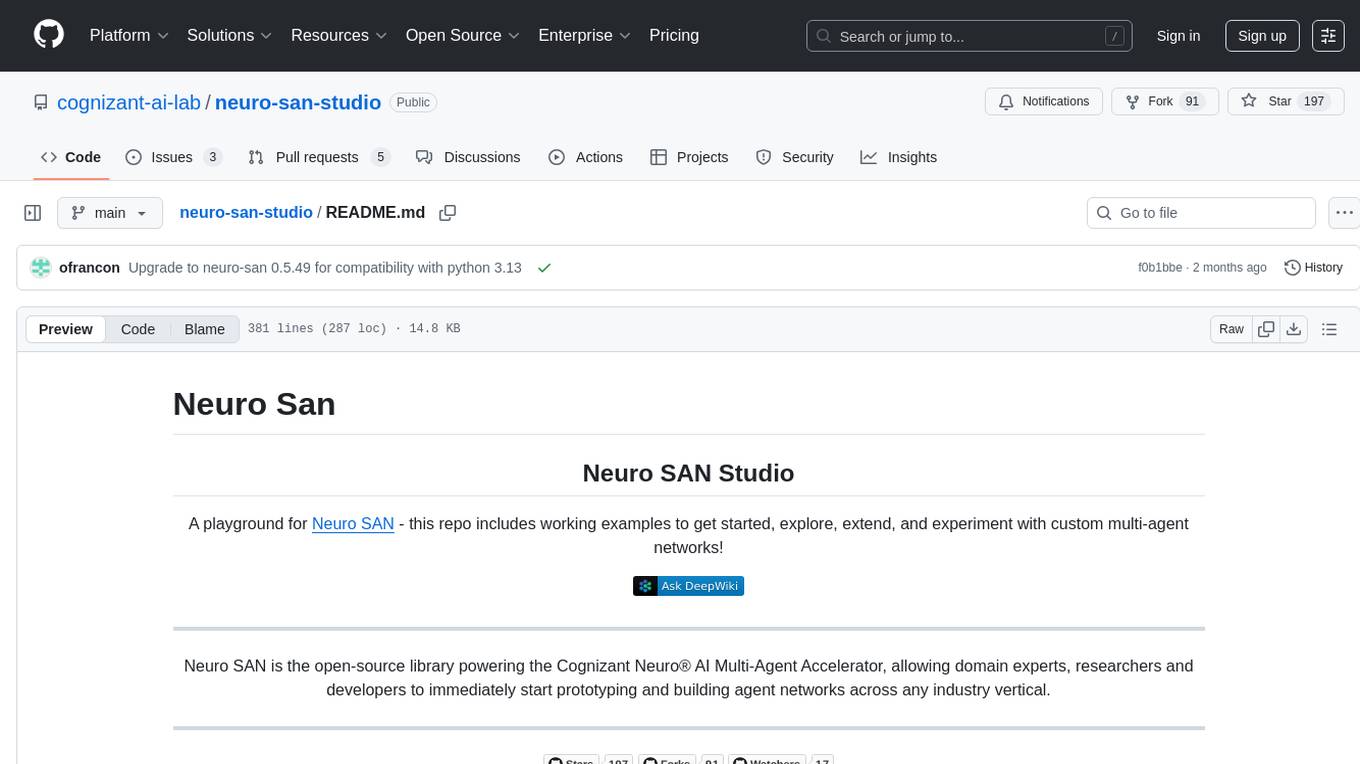
neuro-san-studio
Neuro SAN Studio is an open-source library for building agent networks across various industries. It simplifies the development of collaborative AI systems by enabling users to create sophisticated multi-agent applications using declarative configuration files. The tool offers features like data-driven configuration, adaptive communication protocols, safe data handling, dynamic agent network designer, flexible tool integration, robust traceability, and cloud-agnostic deployment. It has been used in various use-cases such as automated generation of multi-agent configurations, airline policy assistance, banking operations, market analysis in consumer packaged goods, insurance claims processing, intranet knowledge management, retail operations, telco network support, therapy vignette supervision, and more.
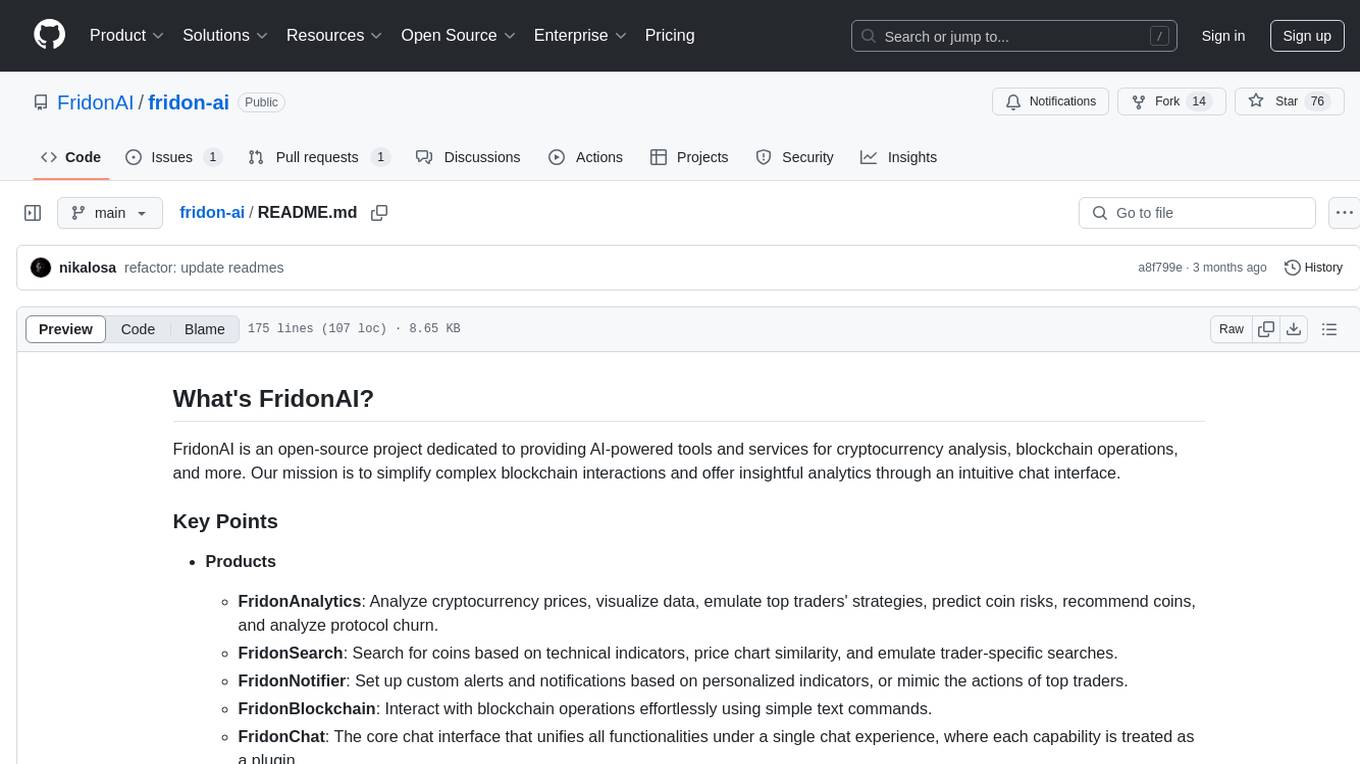
fridon-ai
FridonAI is an open-source project offering AI-powered tools for cryptocurrency analysis and blockchain operations. It includes modules like FridonAnalytics for price analysis, FridonSearch for technical indicators, FridonNotifier for custom alerts, FridonBlockchain for blockchain operations, and FridonChat as a unified chat interface. The platform empowers users to create custom AI chatbots, access crypto tools, and interact effortlessly through chat. The core functionality is modular, with plugins, tools, and utilities for easy extension and development. FridonAI implements a scoring system to assess user interactions and incentivize engagement. The application uses Redis extensively for communication and includes a Nest.js backend for system operations.
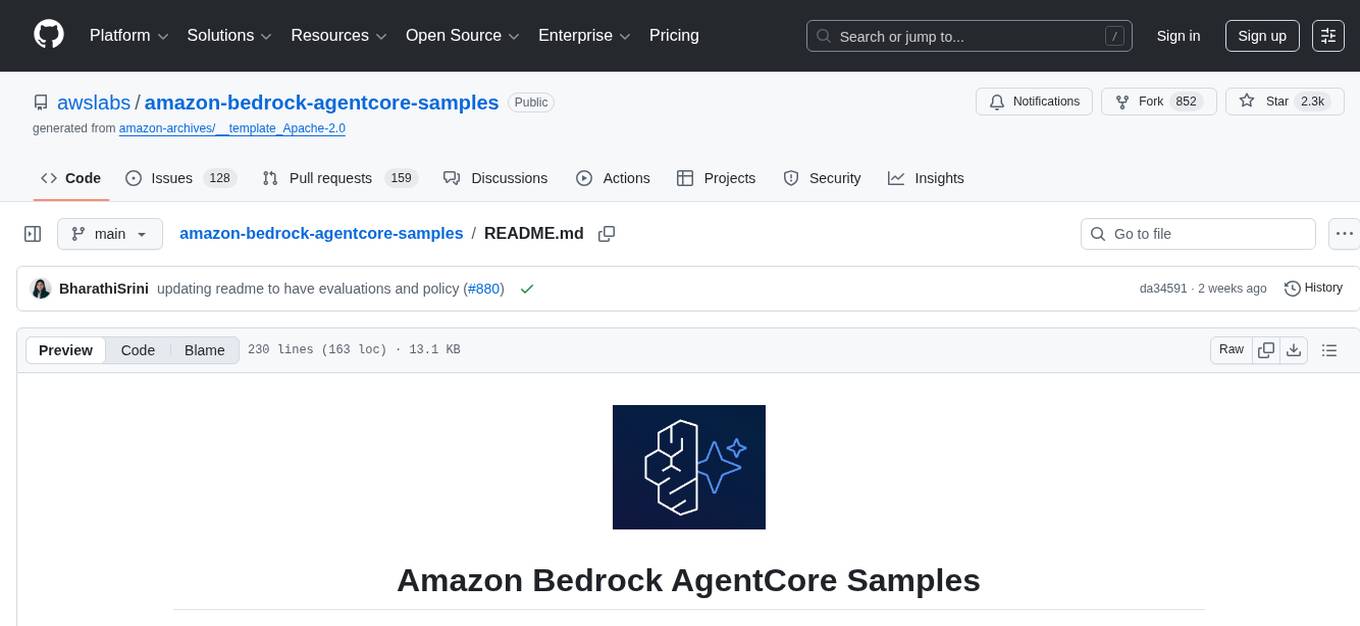
amazon-bedrock-agentcore-samples
Amazon Bedrock AgentCore Samples repository provides examples and tutorials to deploy and operate AI agents securely at scale using any framework and model. It is framework-agnostic and model-agnostic, allowing flexibility in deployment. The repository includes tutorials, end-to-end applications, integration guides, deployment automation, and full-stack reference applications for developers to understand and implement Amazon Bedrock AgentCore capabilities into their applications.
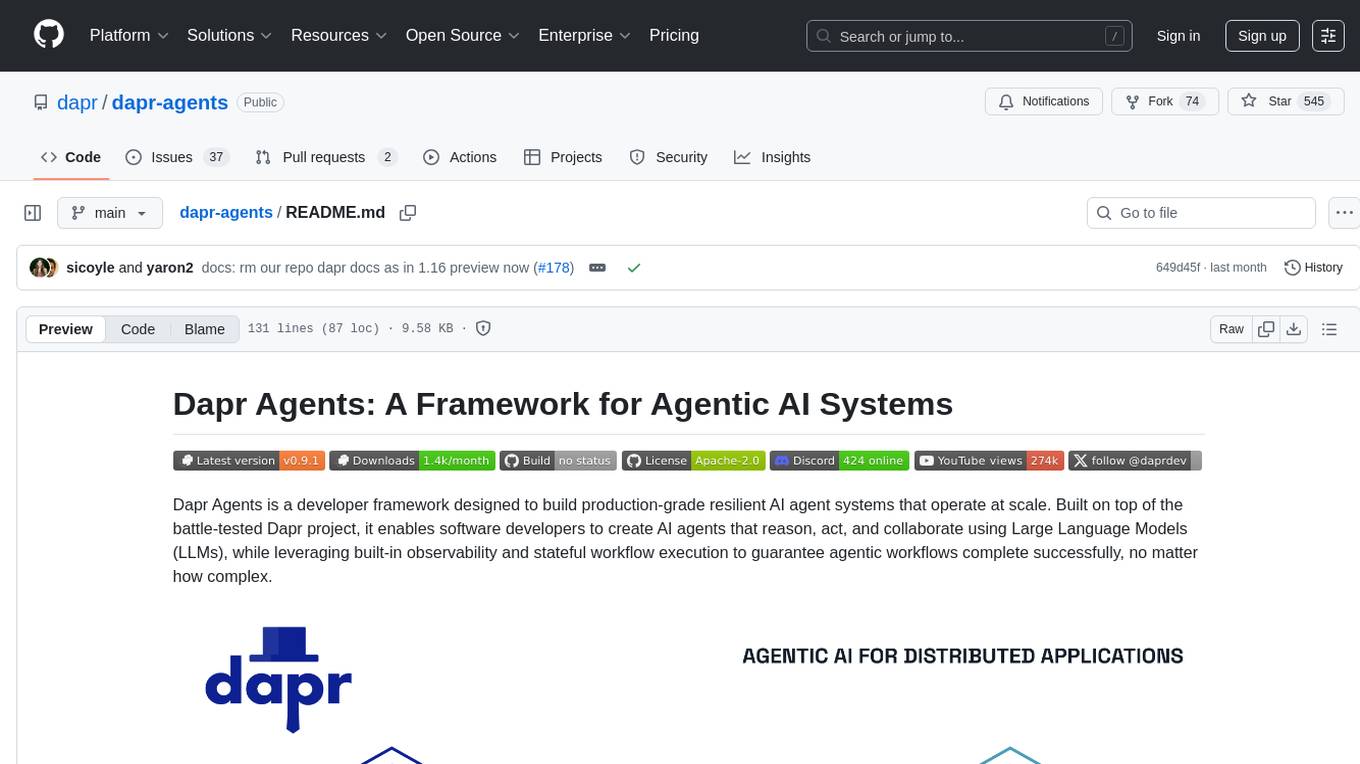
dapr-agents
Dapr Agents is a developer framework for building production-grade resilient AI agent systems that operate at scale. It enables software developers to create AI agents that reason, act, and collaborate using Large Language Models (LLMs), while providing built-in observability and stateful workflow execution to ensure agentic workflows complete successfully. The framework is scalable, efficient, Kubernetes-native, data-driven, secure, observable, vendor-neutral, and open source. It offers features like scalable workflows, cost-effective AI adoption, data-centric AI agents, accelerated development, integrated security and reliability, built-in messaging and state infrastructure, and vendor-neutral and open source support. Dapr Agents is designed to simplify the development of AI applications and workflows by providing a comprehensive API surface and seamless integration with various data sources and services.
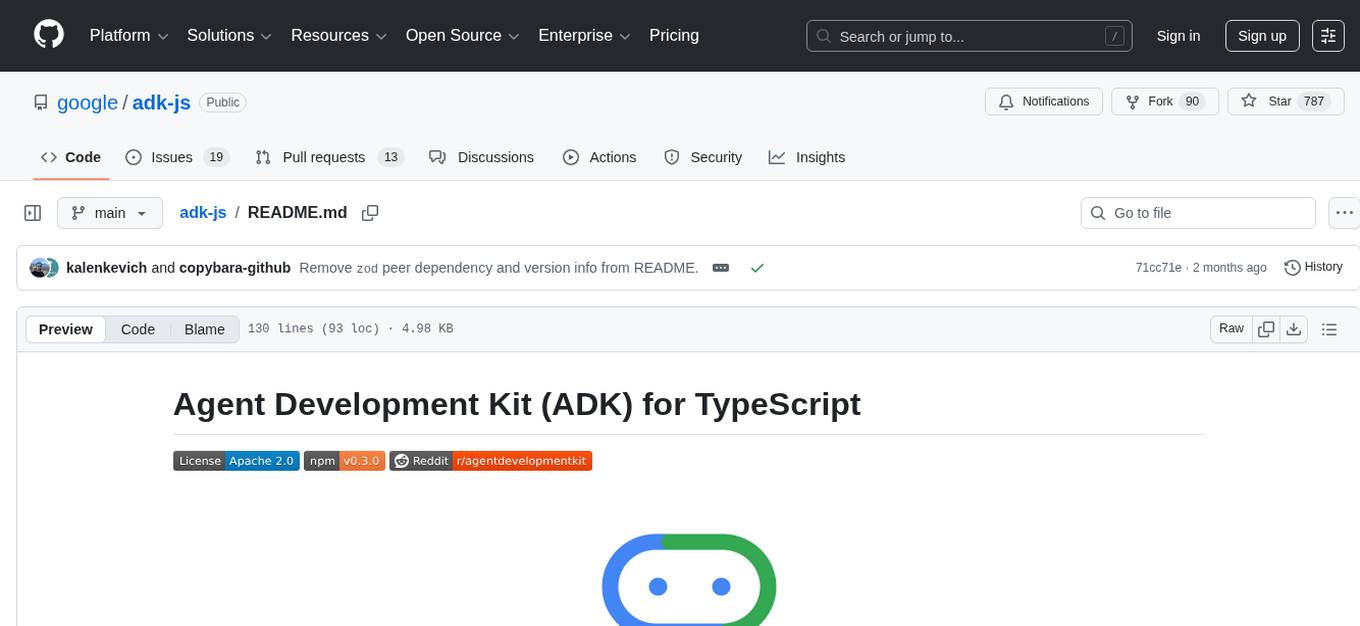
adk-js
Agent Development Kit (ADK) for TypeScript is an open-source toolkit designed for developers to build, evaluate, and deploy sophisticated AI agents with flexibility and control. It allows defining agent behavior, orchestration, and tool use directly in code for robust debugging, versioning, and deployment. With rich tool ecosystem, code-first development, and modular multi-agent systems, ADK offers tight integration with the Google ecosystem and enables the creation of scalable applications by composing multiple specialized agents into flexible hierarchies.

AgentForge
AgentForge is a low-code framework tailored for the rapid development, testing, and iteration of AI-powered autonomous agents and Cognitive Architectures. It is compatible with a range of LLM models and offers flexibility to run different models for different agents based on specific needs. The framework is designed for seamless extensibility and database-flexibility, making it an ideal playground for various AI projects. AgentForge is a beta-testing ground and future-proof hub for crafting intelligent, model-agnostic autonomous agents.
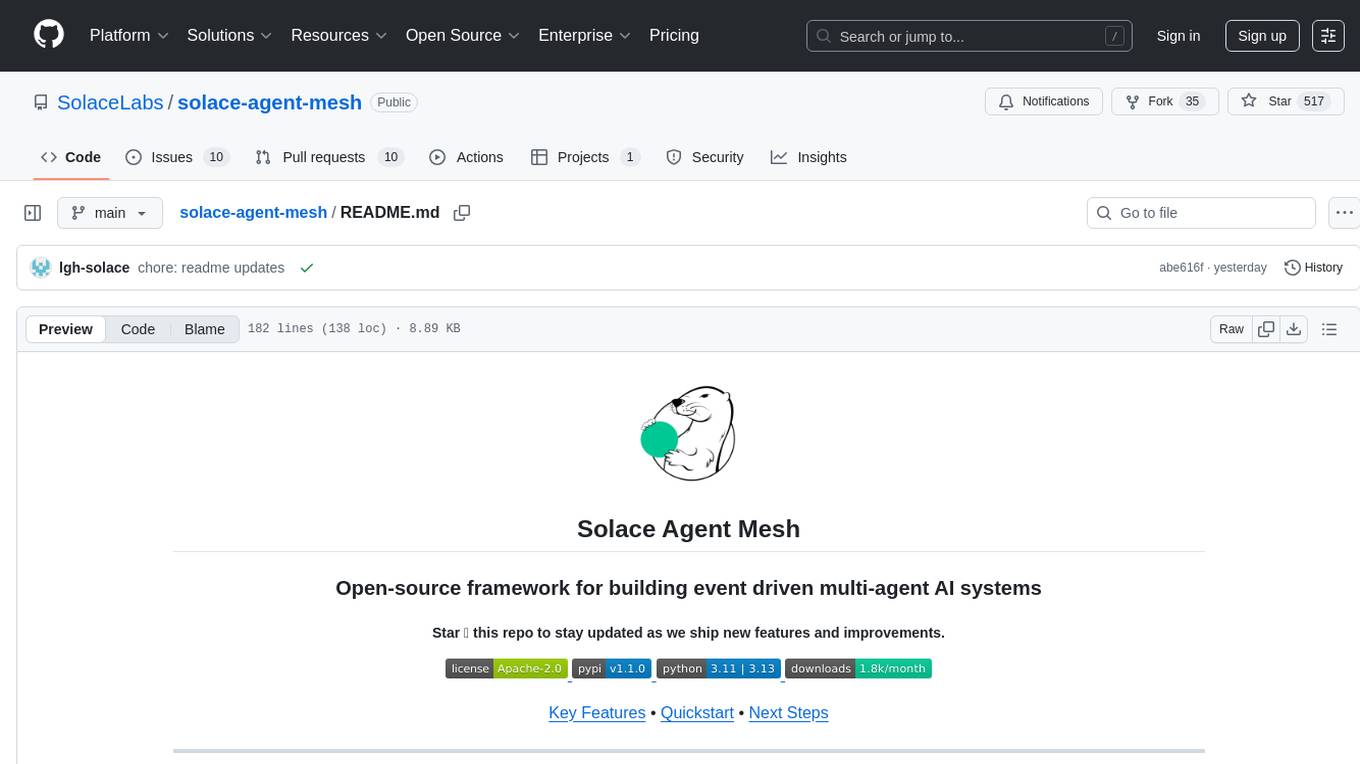
solace-agent-mesh
Solace Agent Mesh is an open-source framework designed for building event-driven multi-agent AI systems. It enables the creation of teams of AI agents with distinct skills and tools, facilitating communication and task delegation among agents. The framework is built on top of Solace AI Connector and Google's Agent Development Kit, providing a standardized communication layer for asynchronous, event-driven AI agent architecture. Solace Agent Mesh supports agent orchestration, flexible interfaces, extensibility, agent-to-agent communication, and dynamic embeds, making it suitable for developing complex AI applications with scalability and reliability.
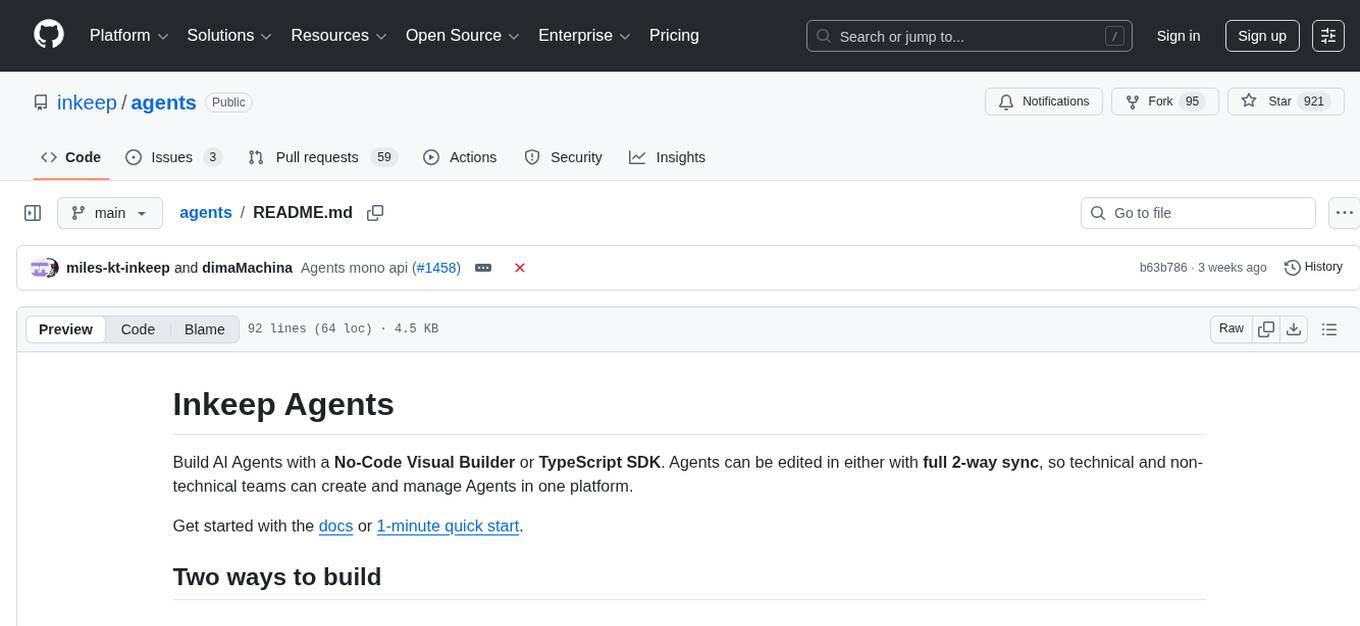
agents
Inkeep Agents is a platform for building AI agents using a No-Code Visual Builder or TypeScript SDK. It allows technical and non-technical teams to create and manage agents collaboratively. The platform supports real-time AI chat assistants and AI workflow automation, with features like multi-agent architecture, MCP tools, UI component library, and observability via Traces UI & OpenTelemetry. Inkeep Agents is interoperable, allowing seamless editing and management of agents in both visual and code formats.
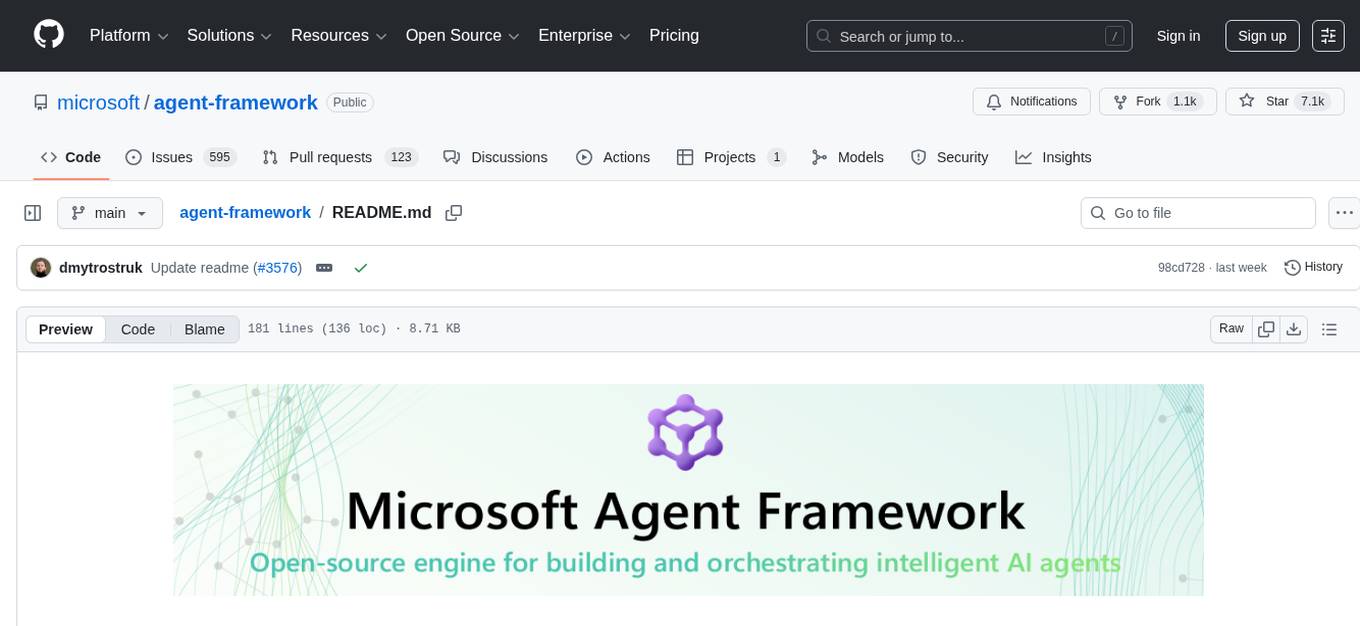
agent-framework
Microsoft Agent Framework is a comprehensive multi-language framework for building, orchestrating, and deploying AI agents with support for both .NET and Python implementations. It provides everything from simple chat agents to complex multi-agent workflows with graph-based orchestration. The framework offers features like graph-based workflows, AF Labs for experimental packages, DevUI for interactive developer UI, support for Python and C#/.NET, observability with OpenTelemetry integration, multiple agent provider support, and flexible middleware system. Users can find documentation, tutorials, and user guides to get started with building agents and workflows. The framework also supports various LLM providers and offers contributor resources like a contributing guide, Python development guide, design documents, and architectural decision records.
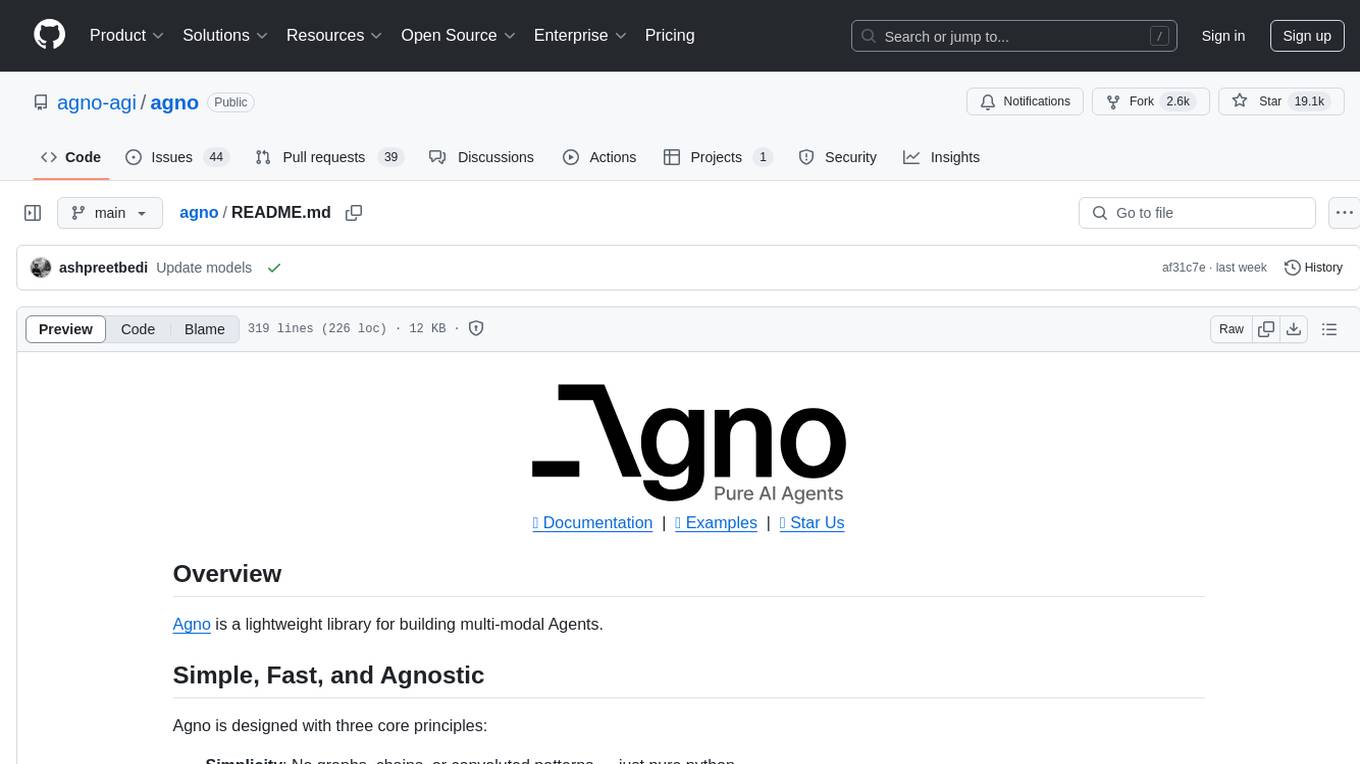
agno
Agno is a lightweight library for building multi-modal Agents. It is designed with core principles of simplicity, uncompromising performance, and agnosticism, allowing users to create blazing fast agents with minimal memory footprint. Agno supports any model, any provider, and any modality, making it a versatile container for AGI. Users can build agents with lightning-fast agent creation, model agnostic capabilities, native support for text, image, audio, and video inputs and outputs, memory management, knowledge stores, structured outputs, and real-time monitoring. The library enables users to create autonomous programs that use language models to solve problems, improve responses, and achieve tasks with varying levels of agency and autonomy.

UltraRAG
The UltraRAG framework is a researcher and developer-friendly RAG system solution that simplifies the process from data construction to model fine-tuning in domain adaptation. It introduces an automated knowledge adaptation technology system, supporting no-code programming, one-click synthesis and fine-tuning, multidimensional evaluation, and research-friendly exploration work integration. The architecture consists of Frontend, Service, and Backend components, offering flexibility in customization and optimization. Performance evaluation in the legal field shows improved results compared to VanillaRAG, with specific metrics provided. The repository is licensed under Apache-2.0 and encourages citation for support.
For similar tasks

activepieces
Activepieces is an open source replacement for Zapier, designed to be extensible through a type-safe pieces framework written in Typescript. It features a user-friendly Workflow Builder with support for Branches, Loops, and Drag and Drop. Activepieces integrates with Google Sheets, OpenAI, Discord, and RSS, along with 80+ other integrations. The list of supported integrations continues to grow rapidly, thanks to valuable contributions from the community. Activepieces is an open ecosystem; all piece source code is available in the repository, and they are versioned and published directly to npmjs.com upon contributions. If you cannot find a specific piece on the pieces roadmap, please submit a request by visiting the following link: Request Piece Alternatively, if you are a developer, you can quickly build your own piece using our TypeScript framework. For guidance, please refer to the following guide: Contributor's Guide
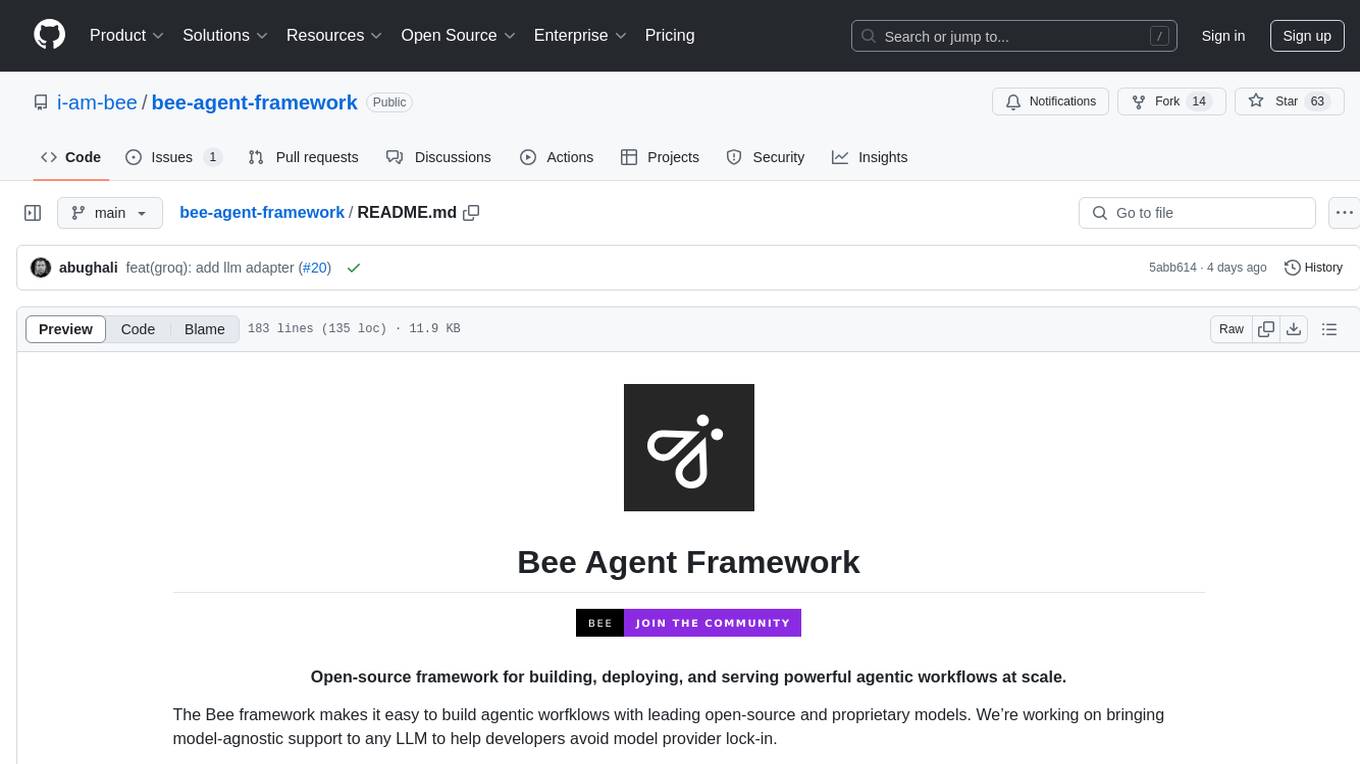
bee-agent-framework
The Bee Agent Framework is an open-source tool for building, deploying, and serving powerful agentic workflows at scale. It provides AI agents, tools for creating workflows in Javascript/Python, a code interpreter, memory optimization strategies, serialization for pausing/resuming workflows, traceability features, production-level control, and upcoming features like model-agnostic support and a chat UI. The framework offers various modules for agents, llms, memory, tools, caching, errors, adapters, logging, serialization, and more, with a roadmap including MLFlow integration, JSON support, structured outputs, chat client, base agent improvements, guardrails, and evaluation.

mastra
Mastra is an opinionated Typescript framework designed to help users quickly build AI applications and features. It provides primitives such as workflows, agents, RAG, integrations, syncs, and evals. Users can run Mastra locally or deploy it to a serverless cloud. The framework supports various LLM providers, offers tools for building language models, workflows, and accessing knowledge bases. It includes features like durable graph-based state machines, retrieval-augmented generation, integrations, syncs, and automated tests for evaluating LLM outputs.
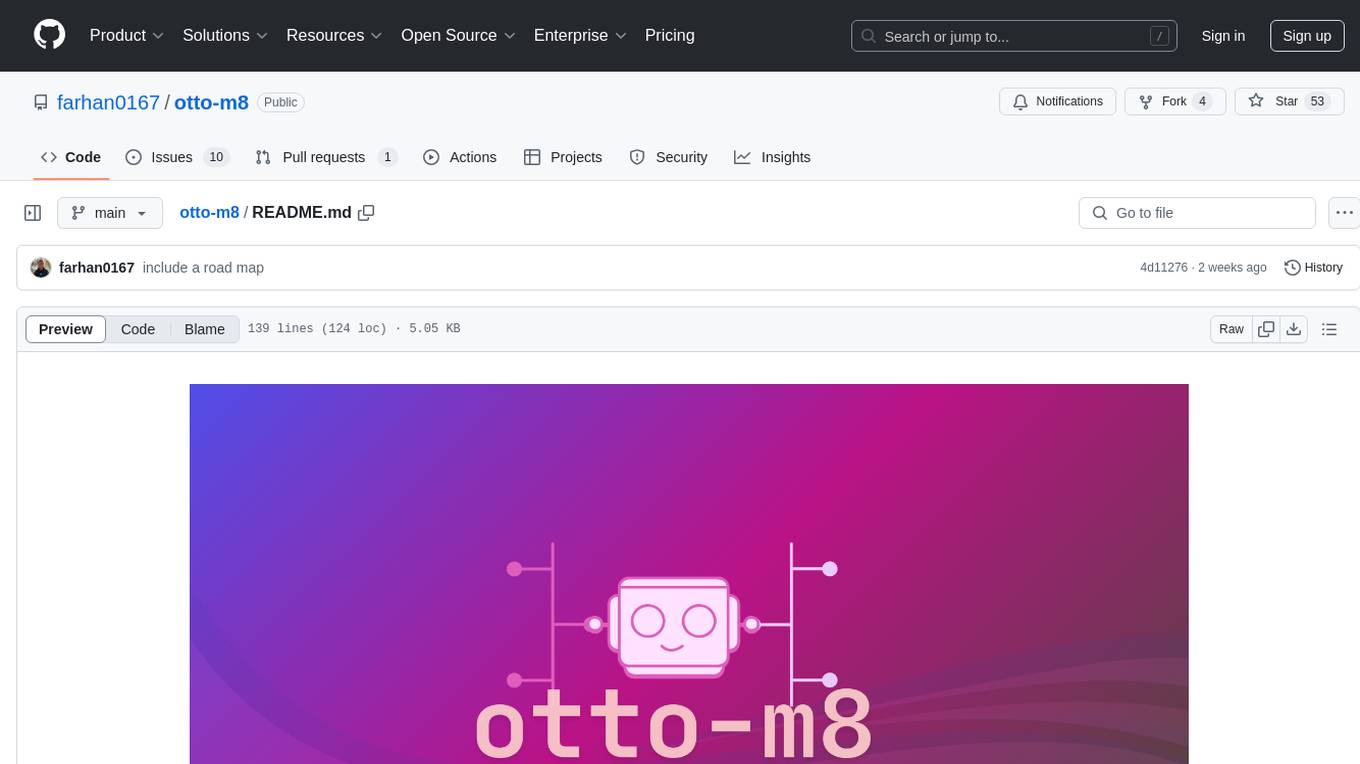
otto-m8
otto-m8 is a flowchart based automation platform designed to run deep learning workloads with minimal to no code. It provides a user-friendly interface to spin up a wide range of AI models, including traditional deep learning models and large language models. The tool deploys Docker containers of workflows as APIs for integration with existing workflows, building AI chatbots, or standalone applications. Otto-m8 operates on an Input, Process, Output paradigm, simplifying the process of running AI models into a flowchart-like UI.
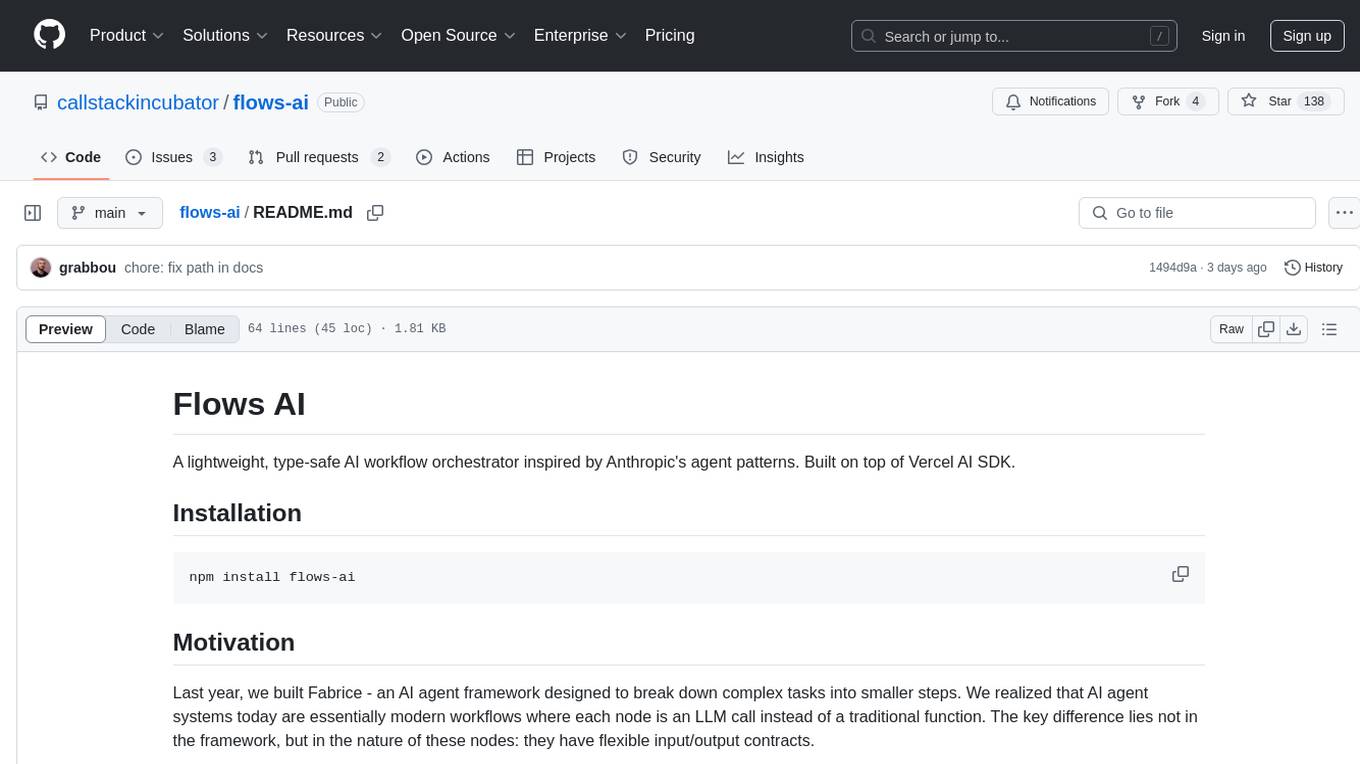
flows-ai
Flows AI is a lightweight, type-safe AI workflow orchestrator inspired by Anthropic's agent patterns and built on top of Vercel AI SDK. It provides a simple and deterministic way to build AI workflows by connecting different input/outputs together, either explicitly defining workflows or dynamically breaking down complex tasks using an orchestrator agent. The library is designed without classes or state, focusing on flexible input/output contracts for nodes.
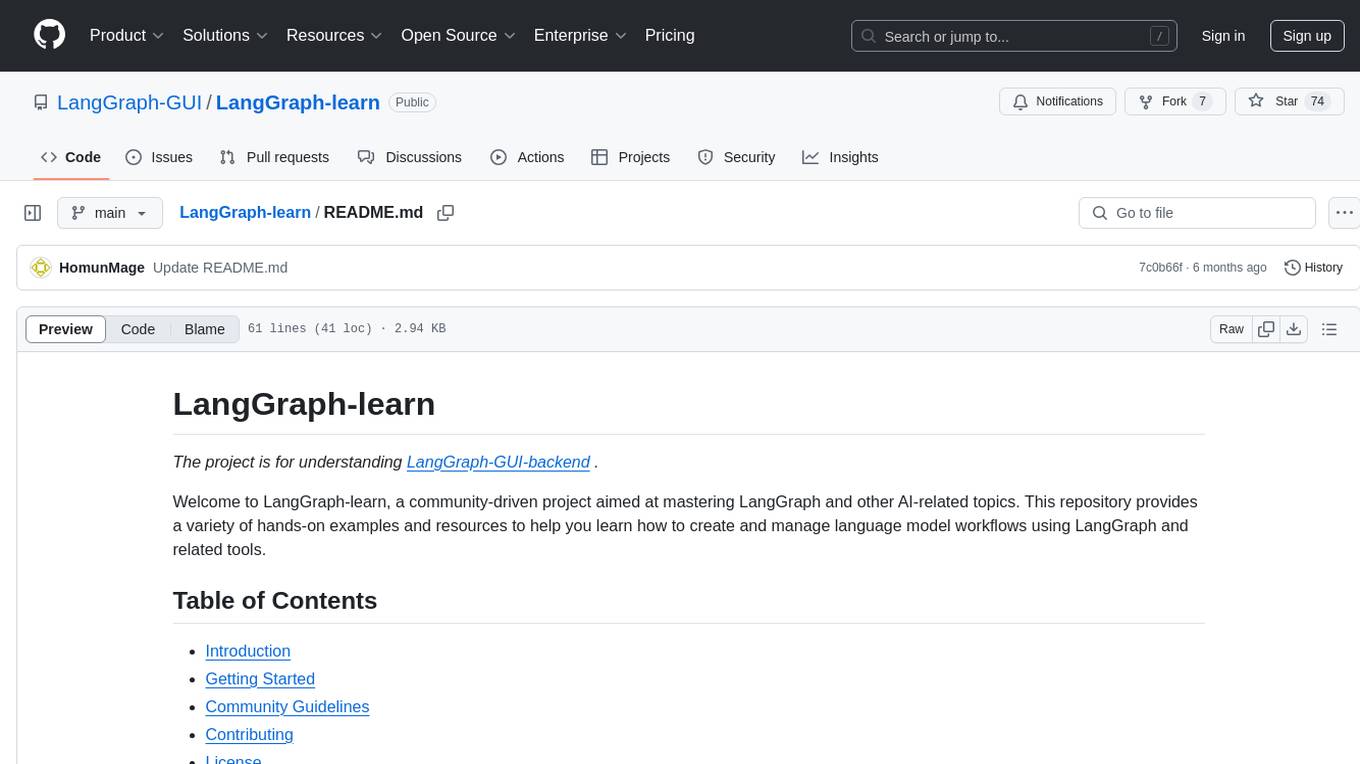
LangGraph-learn
LangGraph-learn is a community-driven project focused on mastering LangGraph and other AI-related topics. It provides hands-on examples and resources to help users learn how to create and manage language model workflows using LangGraph and related tools. The project aims to foster a collaborative learning environment for individuals interested in AI and machine learning by offering practical examples and tutorials on building efficient and reusable workflows involving language models.
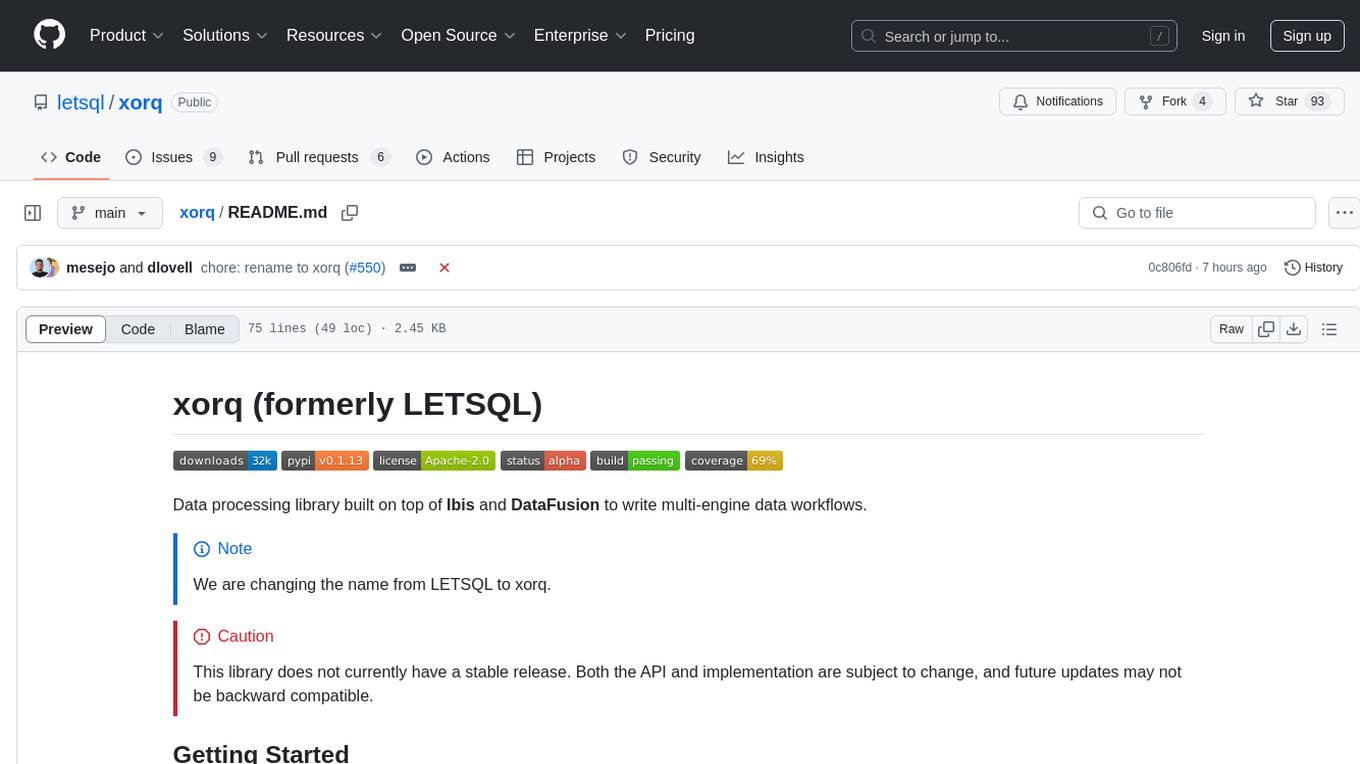
xorq
Xorq (formerly LETSQL) is a data processing library built on top of Ibis and DataFusion to write multi-engine data workflows. It provides a flexible and powerful tool for processing and analyzing data from various sources, enabling users to create complex data pipelines and perform advanced data transformations.
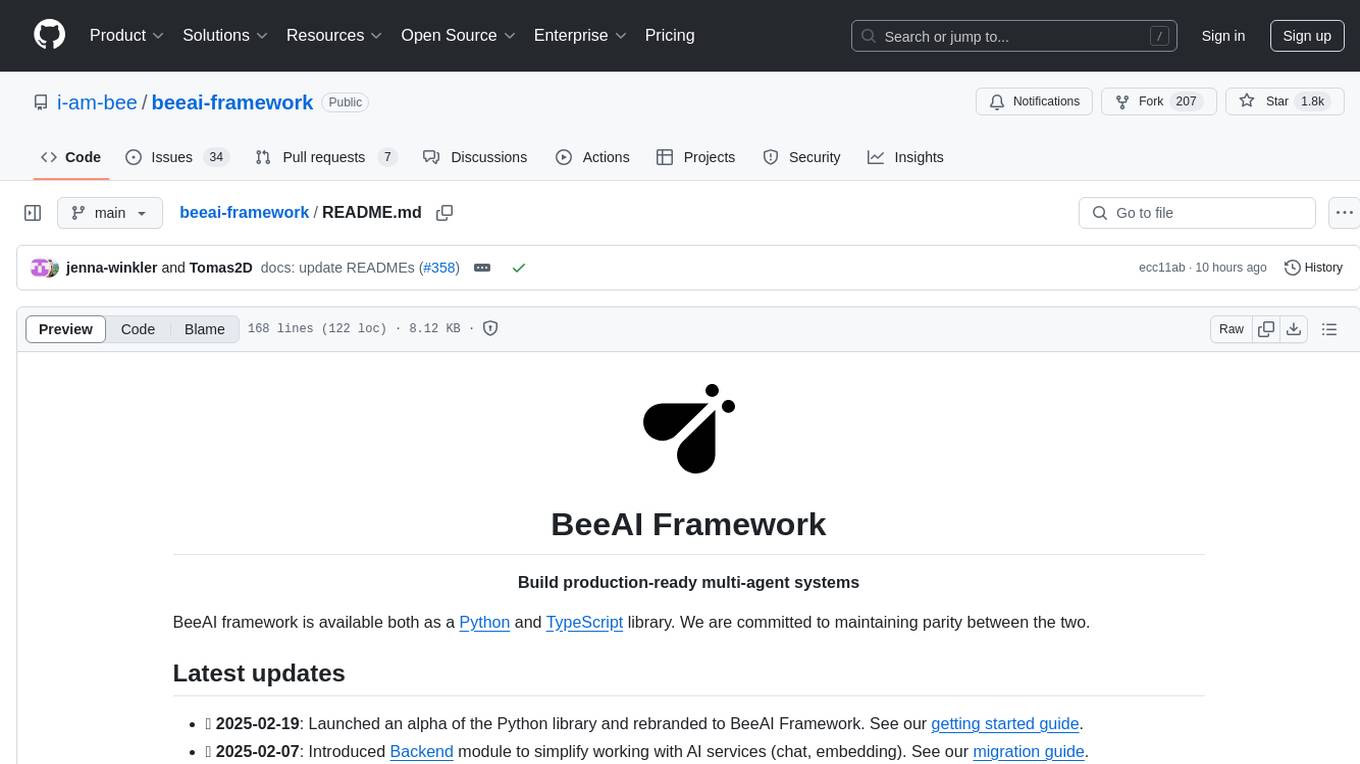
beeai-framework
BeeAI Framework is a versatile tool for building production-ready multi-agent systems. It offers flexibility in orchestrating agents, seamless integration with various models and tools, and production-grade controls for scaling. The framework supports Python and TypeScript libraries, enabling users to implement simple to complex multi-agent patterns, connect with AI services, and optimize token usage and resource management.
For similar jobs

weave
Weave is a toolkit for developing Generative AI applications, built by Weights & Biases. With Weave, you can log and debug language model inputs, outputs, and traces; build rigorous, apples-to-apples evaluations for language model use cases; and organize all the information generated across the LLM workflow, from experimentation to evaluations to production. Weave aims to bring rigor, best-practices, and composability to the inherently experimental process of developing Generative AI software, without introducing cognitive overhead.

LLMStack
LLMStack is a no-code platform for building generative AI agents, workflows, and chatbots. It allows users to connect their own data, internal tools, and GPT-powered models without any coding experience. LLMStack can be deployed to the cloud or on-premise and can be accessed via HTTP API or triggered from Slack or Discord.

VisionCraft
The VisionCraft API is a free API for using over 100 different AI models. From images to sound.

kaito
Kaito is an operator that automates the AI/ML inference model deployment in a Kubernetes cluster. It manages large model files using container images, avoids tuning deployment parameters to fit GPU hardware by providing preset configurations, auto-provisions GPU nodes based on model requirements, and hosts large model images in the public Microsoft Container Registry (MCR) if the license allows. Using Kaito, the workflow of onboarding large AI inference models in Kubernetes is largely simplified.

PyRIT
PyRIT is an open access automation framework designed to empower security professionals and ML engineers to red team foundation models and their applications. It automates AI Red Teaming tasks to allow operators to focus on more complicated and time-consuming tasks and can also identify security harms such as misuse (e.g., malware generation, jailbreaking), and privacy harms (e.g., identity theft). The goal is to allow researchers to have a baseline of how well their model and entire inference pipeline is doing against different harm categories and to be able to compare that baseline to future iterations of their model. This allows them to have empirical data on how well their model is doing today, and detect any degradation of performance based on future improvements.

tabby
Tabby is a self-hosted AI coding assistant, offering an open-source and on-premises alternative to GitHub Copilot. It boasts several key features: * Self-contained, with no need for a DBMS or cloud service. * OpenAPI interface, easy to integrate with existing infrastructure (e.g Cloud IDE). * Supports consumer-grade GPUs.

spear
SPEAR (Simulator for Photorealistic Embodied AI Research) is a powerful tool for training embodied agents. It features 300 unique virtual indoor environments with 2,566 unique rooms and 17,234 unique objects that can be manipulated individually. Each environment is designed by a professional artist and features detailed geometry, photorealistic materials, and a unique floor plan and object layout. SPEAR is implemented as Unreal Engine assets and provides an OpenAI Gym interface for interacting with the environments via Python.

Magick
Magick is a groundbreaking visual AIDE (Artificial Intelligence Development Environment) for no-code data pipelines and multimodal agents. Magick can connect to other services and comes with nodes and templates well-suited for intelligent agents, chatbots, complex reasoning systems and realistic characters.







